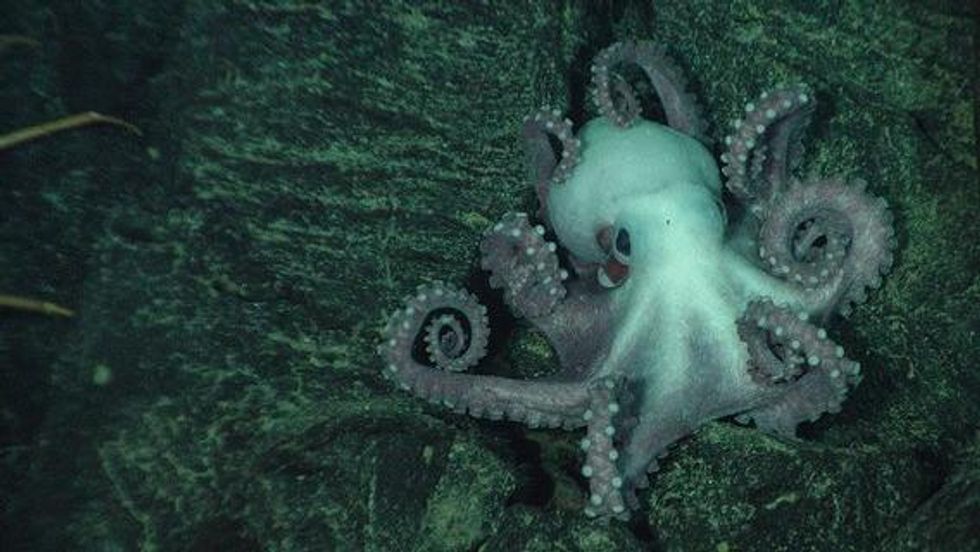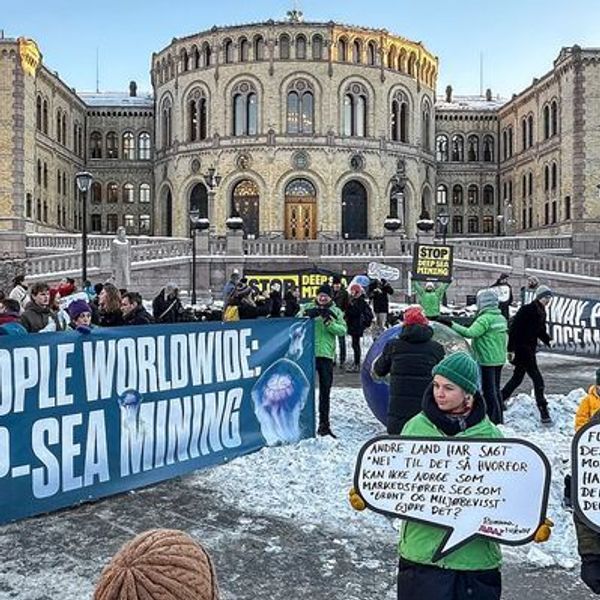Scientists Warn Against Mass Industrialization of Deep Sea
Scientists call for international stewardship of deep ocean ecosystems in face of mining operations

Speaking at the American Association for the Advancement of Science meeting in Chicago, the scientists warned that without international cooperation with a focus on "deep-ocean stewardship," deep sea mining will follow the destructive examples set by commercial fishing and offshore fossil fuel operations.
Vast tracts of deep seabed are already being leased by commercial mining operations, said panelist Professor Lisa Levin, who heads the Center for Marine Biodiversity and Conservation at the Scripps Institution of Oceanography.
Levin told the conference that the surge in demand for consumer devices, such as portable electronics and batteries for hybrid vehicles, is pushing mining companies to expand their operations to the ocean floor to seek out hard-to-find rare earth elements such as nickel, cobalt, manganese and copper.
The imminent threat of deep sea mining "is not something out of science fiction," added Cindy Lee Van Dover, director of the Duke University Marine Laboratory.
"The deep ocean is a vast repository of resources, and looking over the long term--the next hundreds of years, say--we almost surely are going in there to mine," Levin warned.
There are questions that need to be answered "before industrial activity gets ahead of scientific understanding," agreed co-panelist Linwood Pendleton of Duke University's Nicholas Institute for Environmental Policy Solutions.
"Is the value of what we're extracting greater than the damage? Are there ways to extract that might be more economically costly but have lower ecological impact? How can we repair the considerable damage that has already been done to the sea floor through trawling, pollution, and other practices?" he asked.
"As we deplete resources on land and in the coastal zone, there is an inexorable push into deeper water," Levin noted ahead of the conference. "Advanced technology is both creating the demand for resources and driving our abilities to extract them from increasingly greater depths."
BBC continues:
The International Seabed Authority has so far issued 19 prospecting licenses, covering a combined area about the size of Mexico.
These licenses are held by governments and big contractors, such as Lockheed Martin, which operates in the aerospace, defense and civil sectors, and more requests are pending.
_____________________
An Urgent Message From Our Co-Founder
Dear Common Dreams reader, The U.S. is on a fast track to authoritarianism like nothing I've ever seen. Meanwhile, corporate news outlets are utterly capitulating to Trump, twisting their coverage to avoid drawing his ire while lining up to stuff cash in his pockets. That's why I believe that Common Dreams is doing the best and most consequential reporting that we've ever done. Our small but mighty team is a progressive reporting powerhouse, covering the news every day that the corporate media never will. Our mission has always been simple: To inform. To inspire. And to ignite change for the common good. Now here's the key piece that I want all our readers to understand: None of this would be possible without your financial support. That's not just some fundraising cliche. It's the absolute and literal truth. We don't accept corporate advertising and never will. We don't have a paywall because we don't think people should be blocked from critical news based on their ability to pay. Everything we do is funded by the donations of readers like you. Will you donate now to help power the nonprofit, independent reporting of Common Dreams? Thank you for being a vital member of our community. Together, we can keep independent journalism alive when it’s needed most. - Craig Brown, Co-founder |

Speaking at the American Association for the Advancement of Science meeting in Chicago, the scientists warned that without international cooperation with a focus on "deep-ocean stewardship," deep sea mining will follow the destructive examples set by commercial fishing and offshore fossil fuel operations.
Vast tracts of deep seabed are already being leased by commercial mining operations, said panelist Professor Lisa Levin, who heads the Center for Marine Biodiversity and Conservation at the Scripps Institution of Oceanography.
Levin told the conference that the surge in demand for consumer devices, such as portable electronics and batteries for hybrid vehicles, is pushing mining companies to expand their operations to the ocean floor to seek out hard-to-find rare earth elements such as nickel, cobalt, manganese and copper.
The imminent threat of deep sea mining "is not something out of science fiction," added Cindy Lee Van Dover, director of the Duke University Marine Laboratory.
"The deep ocean is a vast repository of resources, and looking over the long term--the next hundreds of years, say--we almost surely are going in there to mine," Levin warned.
There are questions that need to be answered "before industrial activity gets ahead of scientific understanding," agreed co-panelist Linwood Pendleton of Duke University's Nicholas Institute for Environmental Policy Solutions.
"Is the value of what we're extracting greater than the damage? Are there ways to extract that might be more economically costly but have lower ecological impact? How can we repair the considerable damage that has already been done to the sea floor through trawling, pollution, and other practices?" he asked.
"As we deplete resources on land and in the coastal zone, there is an inexorable push into deeper water," Levin noted ahead of the conference. "Advanced technology is both creating the demand for resources and driving our abilities to extract them from increasingly greater depths."
BBC continues:
The International Seabed Authority has so far issued 19 prospecting licenses, covering a combined area about the size of Mexico.
These licenses are held by governments and big contractors, such as Lockheed Martin, which operates in the aerospace, defense and civil sectors, and more requests are pending.
_____________________

Speaking at the American Association for the Advancement of Science meeting in Chicago, the scientists warned that without international cooperation with a focus on "deep-ocean stewardship," deep sea mining will follow the destructive examples set by commercial fishing and offshore fossil fuel operations.
Vast tracts of deep seabed are already being leased by commercial mining operations, said panelist Professor Lisa Levin, who heads the Center for Marine Biodiversity and Conservation at the Scripps Institution of Oceanography.
Levin told the conference that the surge in demand for consumer devices, such as portable electronics and batteries for hybrid vehicles, is pushing mining companies to expand their operations to the ocean floor to seek out hard-to-find rare earth elements such as nickel, cobalt, manganese and copper.
The imminent threat of deep sea mining "is not something out of science fiction," added Cindy Lee Van Dover, director of the Duke University Marine Laboratory.
"The deep ocean is a vast repository of resources, and looking over the long term--the next hundreds of years, say--we almost surely are going in there to mine," Levin warned.
There are questions that need to be answered "before industrial activity gets ahead of scientific understanding," agreed co-panelist Linwood Pendleton of Duke University's Nicholas Institute for Environmental Policy Solutions.
"Is the value of what we're extracting greater than the damage? Are there ways to extract that might be more economically costly but have lower ecological impact? How can we repair the considerable damage that has already been done to the sea floor through trawling, pollution, and other practices?" he asked.
"As we deplete resources on land and in the coastal zone, there is an inexorable push into deeper water," Levin noted ahead of the conference. "Advanced technology is both creating the demand for resources and driving our abilities to extract them from increasingly greater depths."
BBC continues:
The International Seabed Authority has so far issued 19 prospecting licenses, covering a combined area about the size of Mexico.
These licenses are held by governments and big contractors, such as Lockheed Martin, which operates in the aerospace, defense and civil sectors, and more requests are pending.
_____________________

